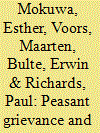|
|
|
Sort Order |
|
|
|
Items / Page
|
|
|
|
|
|
|
| Srl | Item |
| 1 |
ID:
106029


|
|
|
|
|
| Publication |
2011.
|
| Summary/Abstract |
Was the civil war in Sierra Leone (1991-2002) fought for diamonds, or was it a peasant insurgency motivated by agrarian grievances? The evidence on both sides is less than conclusive. This article scrutinizes the peasant insurgency argument via a more rigorous methodology. Hypotheses concerning intra-peasant tensions over marriage and farm labour are derived from an examination of the anthropological literature. These are tested using econometric tools, applied to data from a randomized survey of 2,239 households in 178 villages surrounding the Gola Forest in eastern and southern Sierra Leone, the cradle of the war. It is shown that a decade after the war ended peasant disputes over marriage continue to mark out an incipient class divide in isolated rural communities, as evidenced by cases presented in local courts and family moots. Disputes mainly involve a village elder suing a young man with weak social protection. Fines are exceptionally high, and mostly paid off in the form of coerced farm labour. It is argued that grievance over this long-standing form of labour exploitation fed insurgency, and contributed to the otherwise puzzlingly high levels of peasant-upon-peasant violence associated with the war in Sierra Leone.
|
|
|
|
|
|
|
|
|
|
|
|
|
|
|
|
| 2 |
ID:
118962


|
|
|
|
|
| Publication |
2013.
|
| Summary/Abstract |
Witchcraft has been documented across the globe. The widespread occurrence of such beliefs in modern Africa affects politics, economic development, and poverty alleviation. Anthropologists have analysed the semiotics of African witchcraft, but there is less information on distributional issues. An important question is which communities are most affected, and why? Using data from a survey of 182 villages and 2,443 household heads in the Gola Forest region of eastern Sierra Leone, we examine three manifestations of witchcraft - concerns, conflicts, and detection. We find that where patrimonial relations of agrarian production remain strong, and in settings where market forces are now well established, witchcraft is less of a concern. By contrast, witchcraft manifestations are higher in communities experiencing the competing pull of patrimonial and market norms. Witchcraft, we conclude, is a product of normative ambiguity.
|
|
|
|
|
|
|
|
|
|
|
|
|
|
|
|
|
|
|
|
|